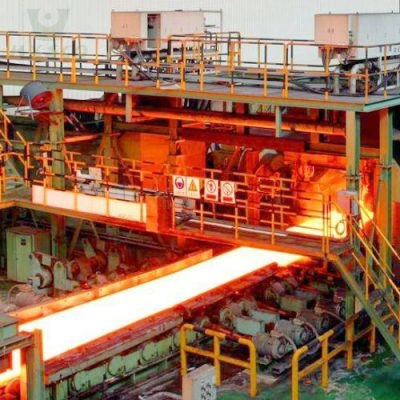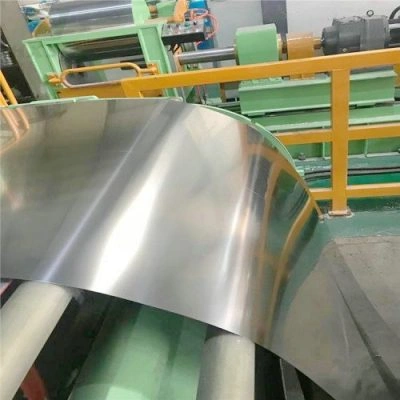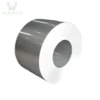Stainless steel is an essential material widely used in various industries due to its exceptional properties and versatility. In this article, we will focus on introducing the 316 Stainless Steel Coil and its significance as a crucial component in industrial applications. Additionally, we will highlight the importance of reliable stainless steel suppliers in sourcing high-quality materials.
Stainless steel is a corrosion-resistant alloy known for its exceptional strength, durability, and aesthetic appeal. It is composed primarily of iron, along with other elements such as chromium, nickel, and molybdenum. These alloying elements enhance the material’s corrosion resistance, high-temperature performance, and overall mechanical properties.
Among the various stainless steel grades, 316 Stainless Steel Coil holds a prominent position due to its exceptional corrosion resistance in harsh environments. This grade contains a higher percentage of chromium and nickel, providing superior resistance to pitting, crevice corrosion, and chloride-induced stress corrosion cracking.
Choosing reliable stainless steel suppliers is crucial for businesses involved in manufacturing and construction. A reputable supplier ensures a consistent and high-quality supply of stainless steel materials, meeting industry standards and specifications. They possess in-depth knowledge of various grades and their applications, assisting customers in selecting the most suitable stainless steel products for their specific needs.
Composition And Properties Of 316 Stainless Steel Coil
Composition
316 Stainless Steel Coil is an austenitic stainless steel alloy containing:
16-18% chromium: Provides excellent corrosion resistance, even in aggressive environments.
10-14% nickel: Enhances corrosion resistance and contributes to the material’s toughness.
2-3% molybdenum: Improves resistance to pitting and crevice corrosion, particularly in chloride environments.
Small amounts of other elements like manganese, silicon, carbon, and nitrogen, which contribute to its overall performance.
Properties
Corrosion Resistance:
The high chromium and molybdenum content in 316 Stainless Steel Coil make it exceptionally resistant to corrosion. It withstands corrosive substances such as acids, salts, and chemicals, making it suitable for various applications in marine environments, chemical processing plants, and coastal structures. It also resists pitting and crevice corrosion, ensuring long-term durability.
High-Temperature Performance:
316 Stainless Steel Coil maintains its strength and mechanical properties even at elevated temperatures. It offers excellent oxidation resistance, making it suitable for applications exposed to high-temperature environments, such as heat exchangers, boilers, and furnace components.
Durability and Strength:
Thanks to its austenitic structure, 316 Stainless Steel Coil possesses outstanding toughness, impact resistance, and ductility. It can withstand heavy loads and mechanical stresses without deformation or structural failure, ensuring long-lasting performance.
In conclusion, 316 Stainless Steel Coil’s composition, corrosion resistance, high-temperature performance, durability, and versatility make it an excellent choice for various industrial applications. Partnering with reputable stainless steel suppliers like HXSCO ensures access to high-quality materials and expert support for your stainless steel needs.
Applications And Cases Of 316 Stainless Steel Coil
316 Stainless Steel Coil is highly regarded for its exceptional versatility, making it a preferred choice in a wide range of industries. Its unique combination of properties allows for diverse applications that require corrosion resistance, durability, and high-temperature performance. The following are some key industries where 316 Stainless Steel Coil is extensively utilized, along with specific examples and success stories.
CHEMICAL PROCESSING
316 Stainless Steel Coil is widely used in chemical processing applications due to its excellent resistance to corrosion from various chemicals and acids. It finds application in: Storage tanks and containers for corrosive substances. Piping systems for transporting chemicals. Heat exchangers and reactors. Equipment for the production of fertilizers, petrochemicals, and pharmaceuticals. Success Story: A chemical processing plant was facing frequent corrosion-related failures in their equipment. By replacing the existing coils with 316 Stainless Steel Coil, they experienced significant improvements in corrosion resistance and equipment longevity, reducing downtime and maintenance costs.
MARINE AND COASTAL ENVIRONMENTS
316 Stainless Steel Coil’s excellent resistance to saltwater corrosion makes it an ideal choice for marine and coastal applications, including: Shipbuilding and offshore structures. Marine equipment and components. Coastal infrastructure like piers, bridges, and seawater desalination plants. Success Story: A coastal city utilized 316 Stainless Steel Coil for the construction of a seawater desalination plant. The coils provided exceptional corrosion resistance, ensuring long-term reliability and efficient water production.
FOOD AND BEVERAGE INDUSTRY
The food and beverage industry demands materials that meet stringent hygiene standards while resisting corrosion from acidic or salty food ingredients. 316 Stainless Steel Coil is utilized in: Food processing equipment such as mixers, blenders, and tanks. Brewing and winemaking equipment. Dairy processing equipment. Commercial kitchen appliances. Success Story: A large-scale brewery upgraded their fermentation tanks with 316 Stainless Steel Coil, ensuring superior corrosion resistance and hygiene standards. This led to improved product quality and increased customer satisfaction.
MEDICAL AND PHARMACEUTICAL INDUSTRY
316 Stainless Steel Coil is widely used in medical and pharmaceutical applications due to its biocompatibility, sterilizability, and corrosion resistance. It is utilized in: Surgical instruments and implants. Medical devices and equipment. Pharmaceutical processing equipment. Success Story: A medical device manufacturer switched to 316 Stainless Steel Coil for their implantable devices. The enhanced corrosion resistance and biocompatibility of the material contributed to improved patient outcomes and reduced complications.
By partnering with reputable stainless steel suppliers like HXSCO, businesses in these industries can access high-quality 316 Stainless Steel Coil and benefit from the expertise and support provided. Suppliers like HXSCO ensure consistent material quality, timely delivery, and assistance in selecting the right coil for specific applications.
In conclusion, the versatility of 316 Stainless Steel Coil is evident through its successful implementation in chemical processing, food and beverage, marine and coastal environments, and the medical and pharmaceutical industry. The material’s exceptional properties contribute to improved performance, durability, and cost-effectiveness in diverse applications, reinforcing its status as a reliable choice for critical industries.
Manufacturing And Quality Control Of 316 Stainless Steel Coil
Manufacturing and quality control processes are crucial aspects of ensuring the reliability and performance of 316 Stainless Steel Coil. Understanding the production methods and quality control measures involved in its manufacturing provides valuable insights into the material’s integrity. Furthermore, partnering with reputable stainless steel suppliers, such as HXSCO, ensures a consistent supply of high-quality 316 Stainless Steel Coil.
Manufacturing Process
The production of 316 Stainless Steel Coil involves several key steps, including:
Raw Material Selection: High-quality raw materials, such as stainless steel ingots, are carefully chosen to ensure the desired chemical composition and purity.
Melting and Refining: The raw materials undergo a melting process, typically in an electric arc furnace, followed by refining techniques like argon oxygen decarburization (AOD) or vacuum oxygen decarburization (VOD) to achieve the desired alloy composition.
Hot Rolling: The refined steel is subjected to hot rolling, a process that reduces the thickness and shapes the material into coils.
Annealing and Pickling: The coils are annealed to relieve stress and enhance the material’s mechanical properties. Subsequently, pickling removes any surface impurities and oxides, ensuring a clean and corrosion-resistant surface.


Quality Control Measures
Stringent quality control measures are employed throughout the manufacturing process of 316 Stainless Steel Coil to ensure consistent quality and performance. These measures include:
Chemical Analysis: Regular testing is conducted to verify the chemical composition of the stainless steel coils, ensuring they meet the required specifications.
Mechanical Testing: Physical properties, such as tensile strength, yield strength, elongation, and hardness, are assessed through mechanical testing to ensure the material’s mechanical integrity.
Dimensional Inspection: Coils are inspected to verify their dimensions, thickness, width, and length, ensuring they meet the specified tolerances.
Surface Examination: Visual and surface inspections are conducted to identify any surface defects, scratches, or imperfections that may affect the material’s quality.
Non-Destructive Testing (NDT): Techniques like ultrasonic testing and eddy current testing are utilized to detect internal and surface defects without damaging the coils.
Certification and Compliance: Reputable stainless steel suppliers, like HXSCO, provide relevant certifications and ensure compliance with industry standards, such as ASTM, EN, or JIS.
Importance of Reputable Stainless Steel Suppliers
Partnering with trusted stainless steel suppliers is essential for procuring high-quality 316 Stainless Steel Coil. Reputable suppliers like HXSCO offer several advantages:
Material Traceability: Reliable suppliers maintain detailed records of the manufacturing process, ensuring traceability and accountability.
Consistent Quality: Reputable suppliers adhere to strict quality control processes to guarantee the consistent quality of their stainless steel coils.
Technical Expertise: They possess in-depth knowledge of stainless steel grades and can provide technical assistance in selecting the most suitable coil for specific applications.
Timely Delivery: Established suppliers prioritize efficient logistics to ensure on-time delivery, minimizing production delays.
By understanding the manufacturing process and partnering with reputable suppliers like HXSCO, businesses can have confidence in the quality and reliability of 316 Stainless Steel Coil. These robust manufacturing practices and quality control measures contribute to the material’s superior performance in various industries, reinforcing its value as a trusted choice for critical applications.
FAQ
When it comes to corrosion resistance, 316 Stainless Steel Coil stands out among other stainless steel grades due to its exceptional performance in corrosive environments. Here is a detailed comparison highlighting the superior corrosion resistance of 316 Stainless Steel Coil over other grades:
Corrosion Resistance:
316 Stainless Steel Coil exhibits excellent resistance to a wide range of corrosive substances, including:
Acids: It resists attack from both organic and inorganic acids, such as sulfuric acid, hydrochloric acid, and acetic acid.
Chlorides: It provides superior resistance to chloride-induced pitting and crevice corrosion, making it suitable for applications in marine environments or chloride-rich environments.
Alkaline Solutions: It withstands the corrosive effects of alkaline solutions, including sodium hydroxide and ammonium hydroxide.
Higher Chromium and Molybdenum Content:
Compared to other stainless steel grades, 316 Stainless Steel Coil contains a higher percentage of chromium and molybdenum. These alloying elements contribute significantly to its superior corrosion resistance.
Pitting and Crevice Corrosion:
316 Stainless Steel Coil’s composition makes it highly resistant to pitting and crevice corrosion, which can be a major concern in many industrial environments.
Improved Resistance in Marine Environments:
The high corrosion resistance of 316 Stainless Steel Coil makes it an ideal choice for marine applications. It outperforms other grades in resisting corrosion caused by seawater and salt spray.
Resistance to Chemical Exposure:
316 Stainless Steel Coil exhibits excellent resistance to various chemicals, including acids, alkalis, and chlorides, which makes it suitable for applications in chemical processing industries.
Compatibility with High Temperatures:
316 Stainless Steel Coil retains its corrosion resistance and mechanical properties even at elevated temperatures, making it suitable for applications involving high-temperature exposure.
Reliability in Medical and Pharmaceutical Industries:
316 Stainless Steel Coil is commonly used in medical and pharmaceutical equipment due to its biocompatibility, corrosion resistance, and ease of sterilization.
Reputable Stainless Steel Suppliers:
Reputable stainless steel suppliers, such as HXSCO, ensure the quality and corrosion resistance of 316 Stainless Steel Coil through strict quality control processes, material traceability, and compliance with industry standards.
In conclusion, 316 Stainless Steel Coil surpasses other stainless steel grades in terms of corrosion resistance, making it an excellent choice for applications in corrosive environments. Reputable stainless steel suppliers like HXSCO play a crucial role in ensuring the quality and corrosion resistance of 316 Stainless Steel Coil through their expertise, quality control measures, and adherence to industry standards.
While 316 Stainless Steel Coil offers excellent corrosion resistance and a wide range of applications, it is important to be aware of certain limitations and considerations when working with this material. Here are key points to keep in mind:
Temperature Limitations:
Although 316 Stainless Steel Coil exhibits good high-temperature resistance, prolonged exposure to extremely high temperatures (above 800°C or 1472°F) can lead to carbide precipitation, affecting its corrosion resistance.
Chloride Environments:
While 316 Stainless Steel Coil provides superior resistance to chloride-induced pitting and crevice corrosion, it may still experience localized corrosion in highly aggressive chloride environments, such as those containing concentrated salt solutions or chlorides at elevated temperatures.
Sensitivity to Certain Chemicals:
316 Stainless Steel Coil can be susceptible to attack in highly oxidizing environments, such as nitric acid, ferric chloride, and hot concentrated alkalis. It is important to carefully evaluate the suitability of 316 Stainless Steel Coil for specific chemical applications.
Stress Corrosion Cracking:
In certain conditions, 316 Stainless Steel Coil can be susceptible to stress corrosion cracking (SCC), particularly in environments containing chlorides, high tensile stresses, and elevated temperatures. Proper design and operating practices should be implemented to minimize the risk of SCC.
Welding Considerations:
During welding, 316 Stainless Steel Coil can be prone to sensitization, resulting in reduced corrosion resistance in the heat-affected zone. Proper welding techniques, including the use of low-carbon filler metals or post-weld heat treatment, can help mitigate sensitization.
Cleaning and Maintenance:
316 Stainless Steel Coil requires appropriate cleaning and maintenance to preserve its corrosion resistance. Regular cleaning, removal of contaminants, and avoidance of harsh cleaning agents are essential to maintain its performance.
Material Selection:
While 316 Stainless Steel Coil is a versatile material, it is important to consider the specific application requirements. In some cases, alternative stainless steel grades or specialized alloys may offer better suitability, such as in highly corrosive or extreme temperature conditions.
Supplier Expertise:
Partnering with reputable stainless steel suppliers, such as HXSCO, ensures access to technical expertise and guidance in selecting the appropriate grade, addressing limitations, and recommending alternative solutions when needed.
Cost Considerations:
316 Stainless Steel Coil may have a higher initial cost compared to some other stainless steel grades. Careful evaluation of the application requirements, expected service life, and long-term cost benefits should be considered when selecting the material.
Compliance with Standards:
When working with 316 Stainless Steel Coil, it is important to ensure compliance with relevant industry standards and specifications, such as ASTM, EN, or JIS, to maintain quality and performance.
In summary, while 316 Stainless Steel Coil offers excellent corrosion resistance and versatility, it is crucial to be aware of its limitations and considerations. Proper material selection, understanding application requirements, adherence to welding guidelines, and regular maintenance are essential for maximizing the performance and longevity of 316 Stainless Steel Coil in various industries. Reputable stainless steel suppliers like HXSCO can provide valuable guidance and support in navigating these considerations.
Yes, 316 Stainless Steel Coil can be customized to meet specific requirements, including size and surface finish. Customization options allow businesses to tailor the material to their unique application needs. Reputable stainless steel suppliers, such as HXSCO, play a crucial role in providing customized solutions. Here are the details:
Size Customization: 316 Stainless Steel Coil can be customized in terms of thickness, width, and length to accommodate specific dimensional requirements. This ensures a precise fit and optimal utilization in various applications.
Surface Finish Customization: The surface finish of 316 Stainless Steel Coil can be customized to meet specific aesthetic or functional needs. Common surface finishes include:
No. 1 Finish: Hot-rolled, annealed, and pickled surface, suitable for industrial applications.
2B Finish: Cold-rolled, annealed, and descaled surface, providing a smooth and reflective finish.
BA Finish: Bright annealed surface, offering a highly reflective and mirror-like appearance.
Brushed Finish: A textured finish created by brushing the surface, giving a unique look and enhanced durability.
Specialized Coatings: 316 Stainless Steel Coil can also be customized with specialized coatings to enhance its performance in certain applications. Examples include anti-fingerprint coatings, protective films, or corrosion-resistant coatings.
Custom Slitting and Cutting: Reputable stainless steel suppliers, like HXSCO, offer custom slitting and cutting services, ensuring the coils are precisely cut into desired widths or lengths, optimizing material usage and minimizing waste.
Surface Protection: During transportation and storage, 316 Stainless Steel Coil can be customized with protective coverings or packaging materials to prevent damage, scratches, or contamination.
Material Grades and Specifications: Stainless steel suppliers, such as HXSCO, offer a wide range of material grades and specifications within the 316 Stainless Steel Coil category. They can provide guidance on selecting the most suitable grade based on specific requirements, such as enhanced corrosion resistance or improved mechanical properties.
Technical Expertise: Reputable stainless steel suppliers possess technical expertise and industry knowledge to understand and address customer-specific requirements. They can offer recommendations on customization options, ensuring the final product meets the desired specifications.
Quality Assurance: Customized 316 Stainless Steel Coil from reputable suppliers undergoes strict quality control measures to ensure compliance with customer specifications and industry standards. This includes dimensional accuracy, surface finish quality, and material composition.
Timely Delivery: Reliable stainless steel suppliers prioritize efficient logistics to ensure on-time delivery of customized 316 Stainless Steel Coil, minimizing project delays and maintaining production schedules.
Collaboration and Support: Reputable stainless steel suppliers like HXSCO collaborate closely with customers, providing technical support, samples, and prototypes during the customization process. They work hand-in-hand to understand the specific requirements and deliver tailored solutions.
In summary, 316 Stainless Steel Coil can be customized to meet specific requirements, including size and surface finish. Reputable stainless steel suppliers like HXSCO offer a range of customization options, ensuring the material aligns with customers’ precise needs. Their technical expertise, quality assurance, and collaborative approach contribute to delivering customized 316 Stainless Steel Coil that meets the highest standards.
Conclusion
In conclusion, 316 Stainless Steel Coil is a versatile and reliable material that offers exceptional corrosion resistance, making it a preferred choice for various industries and applications. Its superior performance in challenging environments, such as marine, chemical, and high-temperature settings, highlights its durability and longevity.
To ensure the highest quality and performance of 316 Stainless Steel Coil, it is crucial to partner with reputable stainless steel suppliers like HXSCO. These suppliers play a vital role in the supply chain, offering expertise, technical support, and a wide range of customization options. Their commitment to quality control, compliance with industry standards, and timely delivery ensures that customers receive customized solutions that meet their specific requirements.
Whether it’s customized sizing, surface finishes, or specialized coatings, stainless steel suppliers like HXSCO are equipped to deliver tailored solutions. Their technical expertise and collaboration throughout the customization process enable customers to optimize the use of 316 Stainless Steel Coil for their applications.
By choosing 316 Stainless Steel Coil from reputable stainless steel suppliers, businesses can have confidence in the material’s reliability, consistency, and long-term performance. This not only enhances the efficiency and functionality of their products but also contributes to cost savings and customer satisfaction.
In conclusion, 316 Stainless Steel Coil, combined with the support and expertise of stainless steel suppliers like HXSCO, offers a winning combination for industries seeking superior corrosion resistance, durability, and customized solutions. Whether it’s for marine, chemical, or other demanding applications, 316 Stainless Steel Coil remains a trusted choice, ensuring the success and longevity of various projects.




